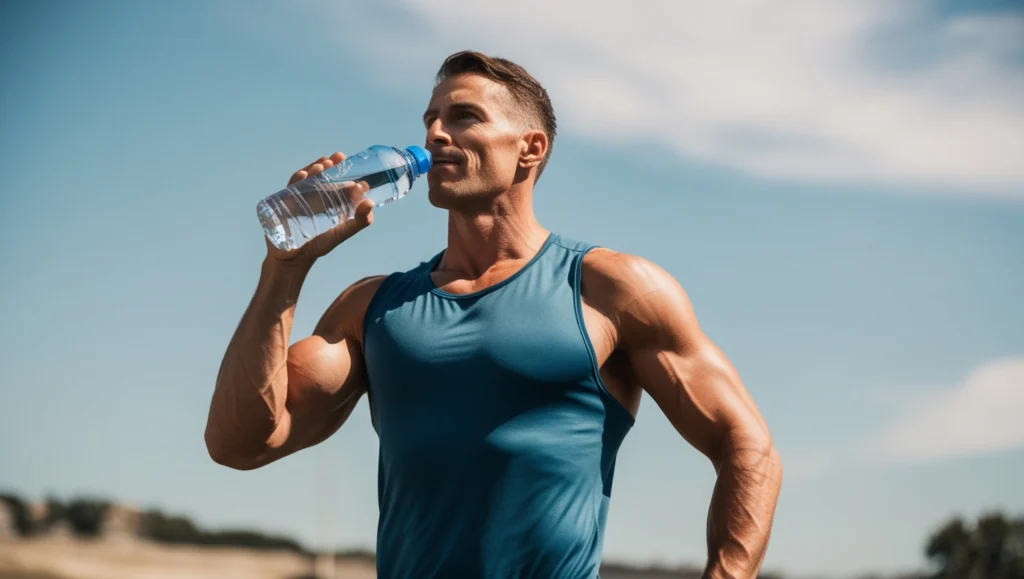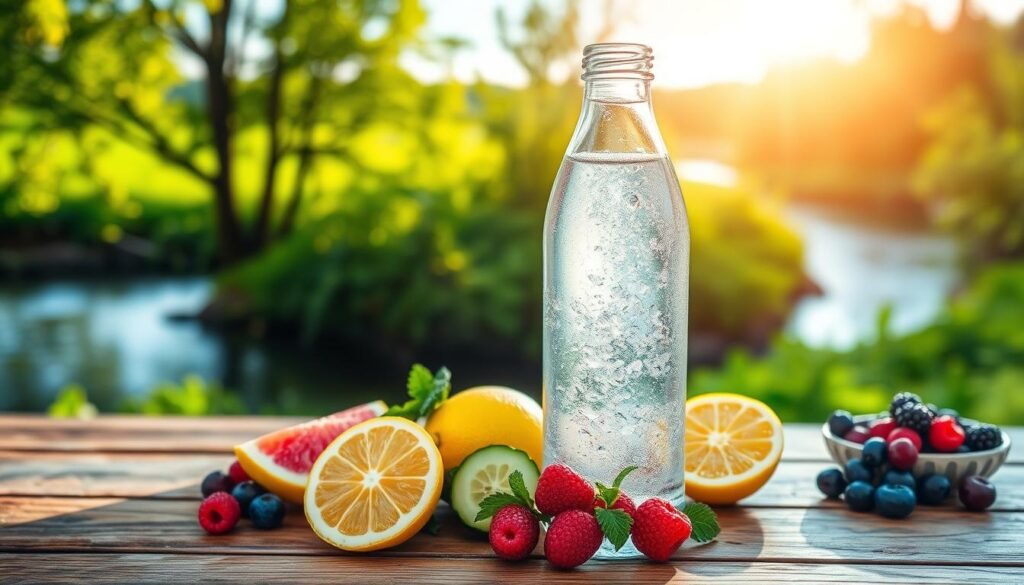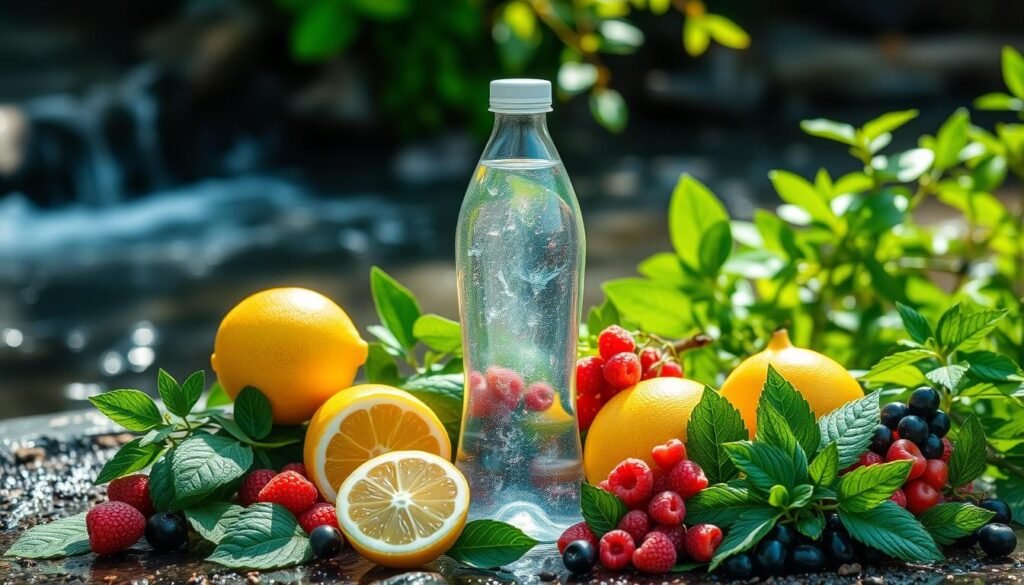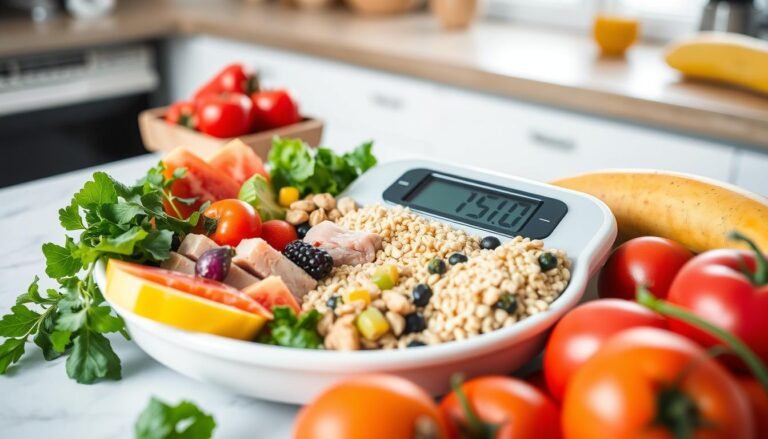A study in the JAMA Network Open on November 25, 2024, found 26.3% of people drank lots of water to lose weight. Researchers at the University of California, San Francisco, showed the correlation between Hydration and Weight Loss. They found drinking water can really help with weight management.
Drinking water boosts your metabolism and helps burn calories. A study showed those who drank 200–250 milliliters of warm water after meals lost more weight. They also had a lower BMI. Drinking one extra cup of water a day can also help prevent weight gain, as seen in a 2013 study.

This article will explore the connection between Hydration and Weight Loss. We’ll discuss how much water you need daily and how to make drinking water a habit. These tips will help you manage your weight successfully.
Key Takeaways
- Drinking enough water can help with weight loss and prevent kidney stones.
- Water helps increase metabolism and burn calories.
- Switching to water from sugary drinks can reduce weight gain.
- Staying hydrated is good for your health and weight management.
- Healthy hydration habits are crucial for losing weight.
Understanding the Science Behind Hydration and Weight Loss
Hydration is key in managing weight, and it’s fascinating to learn why. Drinking enough water can really help your metabolism and energy expenditure. This, in turn, can boost your hydration and weight loss goals.
The Role of Hydration in Metabolism
Drinking water can make your body burn more calories. A 2023 study showed that drinking 200-250 mL of warm water after meals helped people lose more weight. This means staying hydrated can aid in a healthy metabolism and help with weight loss.
How Water Affects Energy Expenditure
Studies suggest that drinking cooled water might increase your resting energy expenditure by 23 calories a day. But, drinking room temperature water didn’t have a big effect. More research is needed to understand how water temperature affects energy expenditure.
Scientific Evidence Supporting Water’s Impact
Research is growing on how water intake affects weight management. One study found that drinking 500 mL of water before meals can cut 75-90 calories from each meal. This shows that staying hydrated can help reduce hunger and aid in weight loss.

“Drinking water can be an effective tool for weight management, as it can boost metabolism, increase energy expenditure, and suppress appetite.”
Daily Water Requirements for Optimal Health
Keeping a good fluid balance and following hydration guidelines is key for health. The usual advice is to drink 8 glasses (8 oz each) or about 2 liters (64 oz) daily. But, your needs can change due to age, how active you are, the weather, and health issues.
For instance, women should drink 2.2 liters (74 oz) and men 3 liters (101 oz) each day. Pay attention to your thirst and drink enough to satisfy it. Mild dehydration signs include dry skin, dark urine, and feeling very tired.
- Drink water when you feel thirsty to maintain fluid balance.
- Adjust your water intake based on factors like exercise, climate, and medical conditions.
- Aim for light yellow or clear urine as an indicator of proper hydration guidelines.
“Staying hydrated is essential for your body to function properly and maintain overall health.”
Knowing your water intake needs and prioritizing hydration helps your body work well. This leads to better health and wellness.

Hydration and Weight Loss: The Proven Connection
Drinking enough water is key for health and helps with weight loss. Many studies show the relationship between Hydration and Weight Loss.
Water’s Effect on Calorie Burning
Water can help burn calories. Drinking water before meals can increase your metabolism by up to 25% for an hour. This can help you lose weight by creating a calorie deficit.
Impact on Appetite Suppression
Drinking enough water can also reduce hunger. A study showed that 2 cups (500 ml) of water can make you feel full. This can lead to eating less and consuming fewer calories.
Relationship with Fat Metabolism
Water helps with fat burning too. It boosts lipolysis, the process of breaking down fat. Staying hydrated supports the body’s natural fat-burning process, aiding in weight management.
Studies show drinking more water can lead to weight loss of 0.4 to 8.8 kg. On average, people lose about 5% of their body weight. This shows how important hydration is for weight loss.
“Drinking water before meals can reduce appetite and food intake in people of average weight and BMI.”
Strategic Timing of Water Consumption
Timing your water intake can greatly impact weight loss. Drinking water before meals can help manage weight. Studies show it can reduce hunger and calorie intake.
A 2023 study found drinking 200-250 mL of warm water after meals led to more weight loss. This shows that drinking water at the right times can boost metabolism and hydration.
- Drink water 30 minutes before meals to help curb hunger and reduce calorie intake.
- Aim to drink at least 8 glasses (64 ounces) of water per day, spread out evenly throughout the day.
- Avoid drinking large amounts of cold water, as it may be associated with higher BMI and waist circumference compared to room-temperature water.
By using these hydration strategies, meal timing, and a consistent water intake schedule, you can aid your weight loss journey. Staying hydrated is a simple yet effective way to manage weight successfully.
“Proper hydration is essential for weight loss and overall health. Timing your water intake strategically can make a significant difference in your results.”
Water Quality and Weight Loss Success
Drinking quality water is key for weight loss. Studies show that water’s mineral content and temperature affect hydration and metabolism. This can influence your weight loss journey.
Filtered vs. Tap Water Benefits
Filtered water removes impurities, but tap water is cheaper and better for the environment. Choose based on your local water quality and personal taste.
Temperature Considerations
Research shows cooled water might boost calorie burning more than room temperature water. Drinking chilled water quality could help burn extra calories.
Mineral Content Impact
Water’s mineral content affects hydration and metabolism. Minerals like magnesium and calcium help with water quality and weight management. Opting for mineral water might aid in your weight loss.
Water quality impacts your weight loss success. While it’s not the only solution, quality filtered water or mineral water can enhance your health and wellness.
“Drinking high-quality water can be a simple yet effective way to support your weight loss journey.”
Common Hydration Mistakes to Avoid
Drinking enough water is key for health and weight control. But, it’s easy to make mistakes that can harm your efforts. Let’s look at some common hydration mistakes and how to avoid them.
Dehydration is a big problem, often caused by not drinking enough. Many people wait until they feel thirsty to drink. But, studies show waiting too long can mean you’re already dehydrated.
Overhydration is also a problem. Drinking too much water without replacing electrolytes can cause hyponatremia. This can lead to nausea, headaches, and even serious health issues. It’s crucial to find a balance in how much water you drink.
Another mistake is believing in hydration myths. Some think drinking water can get rid of eye floaters or help with weight loss. But, there’s no scientific proof for these claims.
- Avoid relying solely on thirst as a hydration indicator.
- Steer clear of excessive water intake, which can lead to electrolyte imbalances.
- Be skeptical of unsubstantiated claims about water’s ability to treat specific health conditions.
By knowing these common mistakes, you can make sure your hydration habits help your health and weight goals. Stay informed, drink the right amount of water, and stay healthy!
“Proper hydration is essential for overall health and wellbeing. Avoiding common mistakes can help you stay on track with your hydration goals.”
Replacing Sugary Beverages with Water
Switching to water can cut down on calories and sugar. Studies found that drinking water instead of sugary drinks can help you lose 0.5 kg (1.1 lb) over four years. This simple change can greatly improve your health and help you reach your weight goals.
Caloric Impact of Beverage Choices
Americans drink a lot of added sugars, with sugar-sweetened beverages being the biggest culprit. A 12-ounce soda has over 10 teaspoons of sugar, which is more than 150 sugar calories. Drinking less of these calorie-dense drinks and more water can significantly reduce your calorie intake.
Transition Strategies
- Slowly cut down on sugary drinks like soda, juices, and sports drinks.
- Add natural flavors to your water, such as lemon, cucumber, basil, or blackberry.
- Try healthy drink alternatives like unsweetened sparkling water, unsweetened tea, or black coffee.
Choosing water as your go-to drink can keep you hydrated, lower sugar and calorie intake, and aid in weight loss.
“Replacing one serving of a sugar-sweetened beverage with water each day can reduce 4-year weight gain by 0.5 kg (1.1 lb).”
Hydration’s Role in Exercise Performance
Drinking enough water is key for good exercise performance and losing weight. It keeps fluid balance right, helps control body temperature, and aids in important metabolic processes. Not drinking enough can really hurt how well you do in exercise and how fast you recover.
The amount of water you need while exercising depends on intensity, duration, and where you are. Athletes should try not to lose more than 2% of their body weight in water.
For instance, a 175-pound athlete losing 3.5 pounds of water might not perform as well. A survey of 295 NCAA track and field throwers found that 287 said dehydration hurts their performance.
To keep up with exercise hydration and sports performance, athletes should drink fluids and electrolytes during their workout. Drinks with electrolytes can rehydrate the body up to three times faster than plain water.
“Proper hydration with electrolytes can rehydrate three times faster than water alone.”
Staying hydrated helps keep fluid balance right and makes sure your body works well during exercise. This can lead to better endurance, more calories burned, and faster recovery. All these help with successful weight management.
Measuring Hydration Status
Keeping your body hydrated is key for good health. Sometimes, our thirst isn’t enough to tell us we need more water. Luckily, we have other ways to check if we’re drinking enough.
Understanding Thirst Signals
Thirst tells us our body needs water. But, we often feel thirsty only after we’ve lost a bit of water. By then, dehydration might already be affecting our brain and body.
Monitoring Urine Color
Checking your urine color is a simple way to see if you’re hydrated. If it’s light yellow, you’re good. But, dark urine means you might need more water.
Other signs like urine specific gravity and osmolality also help. If these are low, it means you’re drinking enough water.
By paying attention to your thirst and urine color, you can keep your body hydrated. This helps you stay healthy and feel your best.
Building Healthy Hydration Habits
Creating a regular hydration routine is key for managing weight and staying healthy. Setting reminders to drink water can help you stay on track. Carrying a water bottle makes it easy to drink water, even when you’re busy.
Eating foods with lots of water, like fruits and veggies, also helps. Slowly drinking more water and cutting out sugary drinks can lead to lasting changes. These changes support your weight loss goals.
Starting small, like drinking water before meals or setting a daily goal, can help you develop good habits. Remember, drinking enough water affects your brain, digestion, and more. So, focusing on your water intake is a smart investment for your health.
FAQ
How does water intake affect weight management and metabolism?
Drinking enough water can help with weight loss and prevent kidney stones. It boosts metabolism and calorie burning. This is because water increases sympathetic activity.
What are the recommended daily water intake guidelines?
The daily water intake is about eight 8-oz glasses, or 2 L. But, needs vary by activity level, age, and climate. Females need 2.2 L (74 oz) and males need 3 L (101 oz) daily.
How does water consumption impact calorie burning and appetite?
Drinking water can burn calories and reduce hunger. Studies show it can lower food intake. It also helps break down fat without raising blood sugar or insulin.
When is the best time to drink water for weight loss?
Drinking 200-250 mL of warm water after meals can lead to more weight loss. Drinking water at different times helps keep you hydrated and supports metabolism.
How does water quality impact weight loss success?
Cooled water may increase energy expenditure more than warm water. Water’s mineral content affects hydration and metabolism. Choose filtered or tap water based on local quality and personal taste.
What are common hydration mistakes to avoid?
Don’t drink too little water or wait until you’re thirsty. Avoid overhydrating. Misreading dehydration signs can lead to not drinking enough.
How can replacing sugary beverages with water support weight loss?
Switching to water can cut down on calories and sugar. Start by drinking less sugary drinks. Try flavoring water with natural ingredients or choose sparkling water instead of soda.
How does hydration affect exercise performance and weight loss?
Hydration is key for exercise and weight loss. Drinking enough water before, during, and after exercise helps with fluid balance and metabolism. Dehydration can hurt performance and recovery.
How can you measure and monitor your hydration status?
Thirst is a sign you need water, but it’s not enough. Check your urine color. Pale yellow means you’re well-hydrated.
What are effective strategies for building healthy hydration habits?
Set reminders to drink water, carry a water bottle, and eat water-rich foods. Gradually drink more water and replace sugary drinks with it. These changes support weight loss and healthy hydration.
Source Links
- How Drinking More Water Can Help You Lose Weight – https://www.healthline.com/nutrition/drinking-water-helps-with-weight-loss
- The Role of Electrolytes in Weight Loss and Hydration – https://www.loseit.com/articles/the-role-of-electrolytes-in-weight-loss-and-hydration/
- Inner Cellular Hydration & Weight Loss: The Connection – https://revitalizeweightloss.com/blog/hydrate-restoring-energy-and-burning-fat-one-drop-at-a-time/
- Optimal Water Intake for Weight Loss Revealed – https://www.buzzrx.com/blog/how-much-water-do-i-drink-to-lose-weight
- Water weight: What it is, causes, and how to lose it – https://www.medicalnewstoday.com/articles/320603



